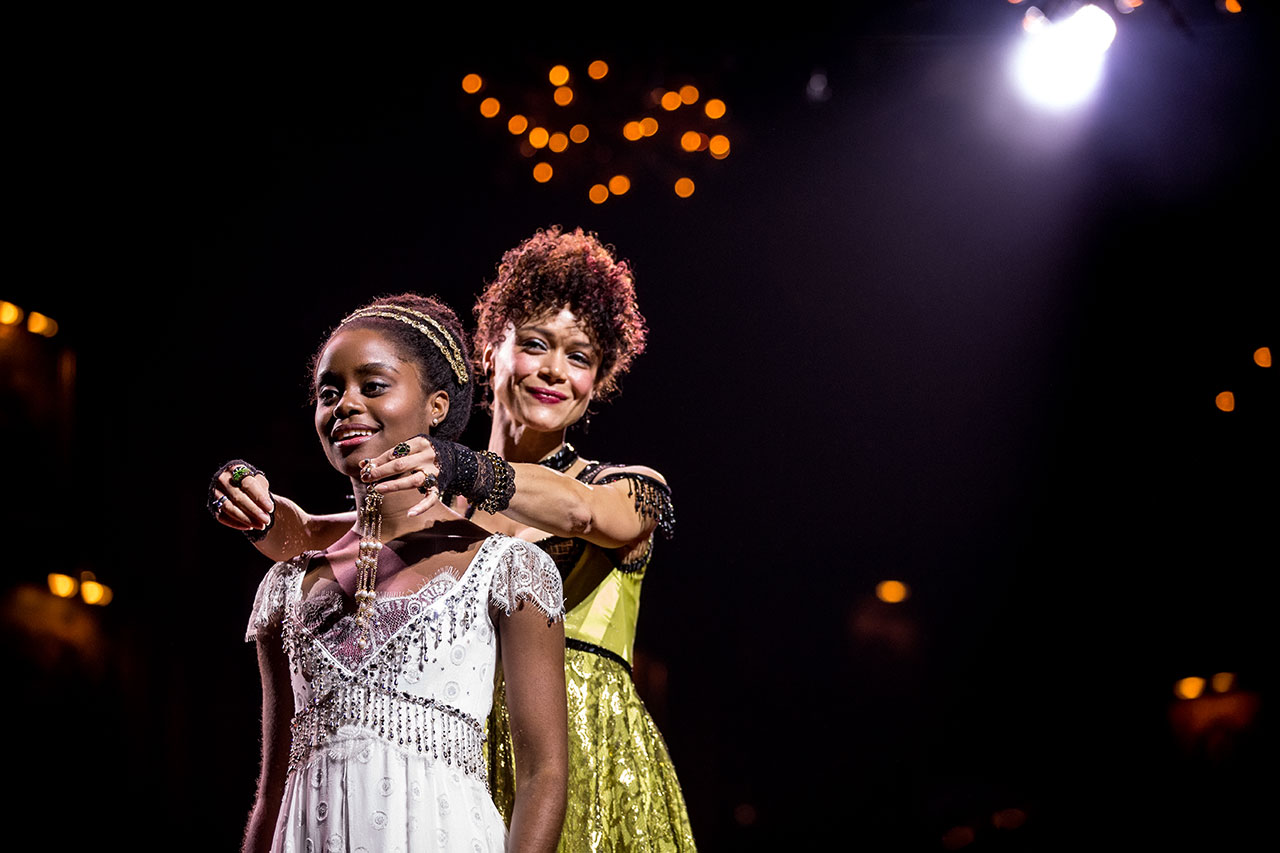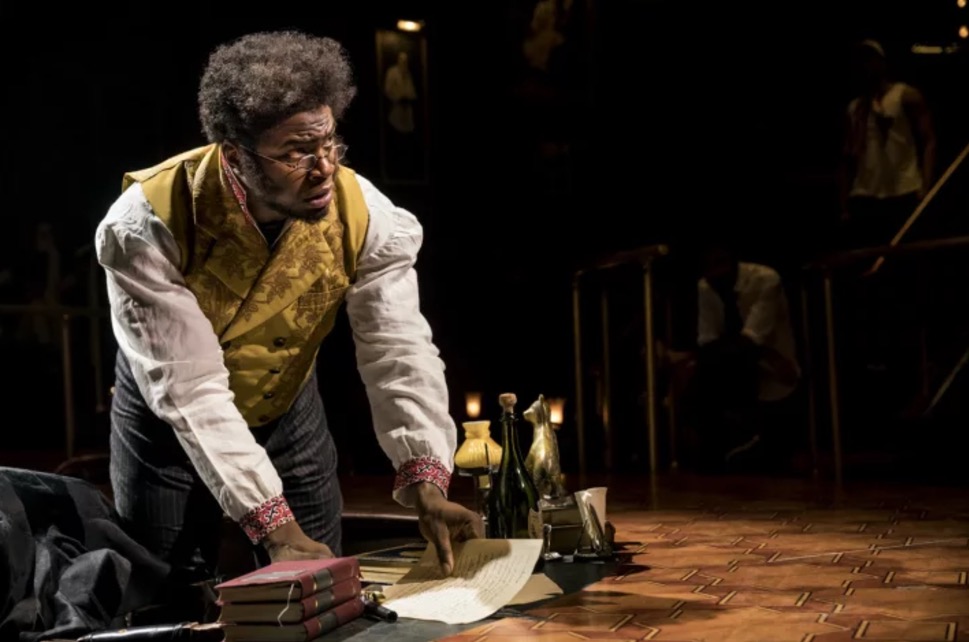

We Were There
We Were There: Natasha, Pierre & The Great Comet of 1812
Published
9 years agoon
On March 2, 2017, I saw Natasha, Pierre & The Great Comet of 1812.
On March 3, 2017, I woke up still perplexed by the tour de force I witnessed… but maybe… in a good way?
Let me explain.
First of all, it is impossible to walk into the theatre and not get taken aback by the gorgeously designed set. Stairs, tables, and chairs intermix on the stage, walkways built into the orchestra, maroon velvet and portraits line the walls, and comet-inducing chandeliers hang from the ceiling. Along with the Tony Award Mimi Lien deserves for her scenic design, this set really ought to be preserved in a museum.
Sitting down in my orchestra seat, I looked on as a cast member poured vodka from one of the bars built into the set, and felt like a patron at a dinner club, or better yet a casino—where many things are going on at once, with infectious spirit, yet all competing for my attention. The lights dimmed and the show began, but this feeling didn’t leave as I consistently fought to understand: is what I’m seeing all that I’m going to get?
With high energy, the ensemble sings of a war going on and an Andrey, who apparently isn’t present, setting the focus while teasing that we’re at the Opera listening to a complicated Russian story. The prologue is a fun, necessary dive into the essence of each character, and the first look into the comedic thread that ties the show together.
Based on a passage of Leo Tolstoy’s “War and Peace”, The Great Comet centers on Natasha, her engagement to Andrey (off at war), and her love affair with an aristocratic hedonist, Anatole (played by Lucas Steele). All of this taking place during the Napoleonic Wars, yet comfortably nestled in the glitz, glamour, and strobe lights of aristocratic Moscow.
And that, folks, is where the story lives. But hey, restraint in one area allows for extravagance in others?
Denée Benton makes an inspiring Broadway debut as Countess Natasha. Her voice matches her undeniable beauty, nimbly soaring over Dave Malloy’s chameleonic score, which shapeshifts from Russian folk, electronica, and pop rock to traditional musical theatre soliloquies and expressive arias—after all, we’re at the Opera, right?
It’s refreshing and important to see a Black woman with natural hair, trusted to play an ingénue, and one of Russian aristocracy at that; but more important is the fact that she does it so well. She’s young, she’s sweet, she’s funny, and she’s charming. She conducts and controls the emotional state of the audience with a look and with her smile, and because of this finesse, we stay by her side, bad decision after bad decision.
Image: Chad Batka
Music artist Josh Groban stars as Pierre and also celebrates his Broadway debut. He spends the majority of the time introspectively gazing at other characters from the stage, often playing the piano or accordion. But trust: when he opens his mouth to sing, it’s showtime.
He grounds the show in sincerity, providing an earthy depth and satin complexity to a man consumed in self-loathing and existential defeatism. We feel for him, and, in fact, I had more investment in his story—his call to wake up and lead a life full of love—and longed to see the desires described in the most memorable song of the show, “Dust and Ashes,” fulfilled.
Amber Gray, who’s been with the show since its first production at Ars Nova, equally commands attention as Hélène, Anatole’s sister (and possibly incestuous lover?), snatching our edges with a sensible belt and growl (go ahead and put “Charming” on repeat). We lean into Brittain Ashford’s (Sonya) sultry and affecting “Sonya Alone.”
Through the satire, eccentricity, and at times, strictly narrative third person book, Rachel Chavkin’s direction rises above, showing roots in wit, which brings out laughter at the best moments and empathy at the sincerest.
My heart fills with excitement because, this, to me, works as an ensemble piece—and the ensemble exudes joy with every strum of the guitar, bowing of the violin, high kick, and Slavic folk dance. The stamina needed to pull off a show of this magnitude is paramount and deserves applause. Comet’s magic, however, is in the celestial transcendence achieved when the room darkens, the chandeliers shimmer, and the ensemble surrounds us with both their presence and warm, angelic voices (ie: “The Great Comet of 1812” and “Dust and Ashes”).
Image: Chad Batka
More experience and performance than plot, I graciously acknowledge that The Great Comet of 1812 may be the most exciting, new, and innovative show you’ll see this season. It’s up to you to decide if you seek entertainment or if you seek a story.
The cast also currently features Grace McLean as Marya, Nick Choksi as Dolokhov, Nicholas Belton as Andrey/Bolkonsky, Gelsey Bell as Mary, and Paul Pinto as Balaga.
Sumayya Ali, Courtney Basset, Josh Canfield, Kennedy Caughell, Ken Clark, Erica Dorfler, Lulu Fall, Ashley Pérez Flanagan, Nick Gaswirth, Alex Gibson, Brad Giovanine, Billy Joe Kiessling, Mary Spencer Knapp, Blaine Alden Krauss, Reed Luplau, Brandt Martinez, Andrew Mayer, Mary Page Nance, Shoba Narayan, Azudi Onyejekwe, Pearl Rhein, Celia Mei Rubin, Heath Saunders, Ani Taj, Cathryn Wake, Katrina Yaukey, and Lauren Zakrin portray various ensemble roles.
Production has wrapped on a full Broadway cast recording. Groban, after several extensions, plays his final performance on July 2nd. Hamilton‘s Okieriete Onaodowan will step into the role of Pierre beginning July 3rd.
For tickets, follow the Great Comet.
Save
Save
You may like
2 Comments
Leave a Reply
Cancel reply
This site uses Akismet to reduce spam. Learn how your comment data is processed.
Reviews
Fabulation or, The Re-Education of Undine by Lynn Nottage — Review
Published
7 years agoon
January 3, 2019
Afro-American narratives are experiencing a meteoric surge in the proliferation of the modern mainstream liberal white consciousness in the nation, critics will say, and they aren’t wrong. When All Arts circulated playwright Donja R. Love’s “List of Black Theater in New York City,” an alphabetized inventory of some of the most anticipated or under-the-radar stage shows by black storytellers and griots initially published on his Facebook page, the effect was cataclysmic, inspiring similar lists by other underserved and undervalued communities alike. But most exhilarating was the writer’s additional note that 31 of the 55 new works of the 2018-2019 theatre season are by black women and black femmes, which is unprecedented, considering especially how white, homogenized and segregated contemporary theatre is in The Capital of the World.
Enter Lynn Nottage’s 2004 satirical riches-to-rags comedy “Fabulation or, The Re-Education of Undine,” directed by Lileana Blain-Cruz, which receives a long overdue remounting within the Romulus Linney Courtyard Theatre at the Pershing Square Signature Center, kicking off a three-play residency for the storyteller at the acclaimed off-Broadway theater. Nottage, the first and only woman to take home the Pulitzer Prize for Drama twice—the first in 2009 for “Ruined,” and the second in 2017 for “Sweat,” both naturalistic tragedies—delivers a, dare I say, family-friendly romp filled to the brim with subtle updated observations on upward mobility and respectability politics that should come with more fanfare than it is unlikely to obtain from theatergoers or middle-of-the-road critics. That’s because often, many of the shows produced for commercial run seem tailored to the white gaze, with a particular caliber of plays being penned with the predilection for black suffering. However, “Fabulation,” a love-note to Nottage’s grandmother and whose target audience is Black women, in particular, creates a joyous farce that mocks both the upper elite and poverty porn with bombast.
The show depicts 37-year-old Undine Barnes Call-es (Cherise Boothe), a high octane black female business executive and head of her own Manhattan boutique publishing firm who seems to be in control, making moves from her high-rise office. Until she discovers, while trying to book a celebrity for the Fallopian Blockage ball, that Hervé, her Argentine husband has embezzled all of her savings and absconded. Body-slammed by a blitz of bad luck, a visit by an FBI agent signals that she’s also being investigated for identity fraud, stating she seems “to have materialized from the ether.” Which, as we find out, is correct: Undine’s real identity is Sharona Watkins, who grew up a Brooklyn public housing project, the product of working-class security guards. Yikes!
Her fall from grace and the public eye are similar to the Book of Job: While Undine is far from a good person (she carelessly expunged her family in a magazine profile, falsely claiming they perished in a fire), her financial ruin causes public shame, forcing her to file for bankruptcy and to return to her parents in Fort Greene. In addition, her security guard brother Flow, a cypher-spitting Iraq war veteran, mocks her when he’s not rhyming about Br’er Rabbit and Uncle Remus; long-lost friends from childhood know nothing of her Dartmouth education or achievements; and she’s sharing sleep quarters with her heroin-addicted grandmother. To make matters worse, during a routine check-up after suffering a severe anxiety attack, Undine’s discovers she’s pregnant and left to wait in the purgatory of a Social Services office with a self-righteous over-the-counter clerk to get welfare. But the cherry on top? After reluctantly agreeing to buy drugs for Grandma, Undine gets arrested and is ordered to join a drug counseling group. A bit of a ham, Undine engineers a tale of deception, fabricating a life of addiction that began with Percocet. There, she meets an optimistic ex-con and recovering addict who admits that just three years prior he was “that brother you cross the street to avoid,” nevertheless his sincerity and genuine empathy are welcomed and even refreshing considering the circumstances. Still, there are reminders of her posh past life: Her self-made gal pal Alison, who reminds her that, “There is nothing less forgiving than Bourgie Negroes,” just before marooning Undine outright; her fashion-forward former assistant is employee of the month at a Duane Reade drugstore and is just as hypercritical as her; and a childhood friend mixes and mingles with the black NYC in-crowd.
.Montana Levi Blanco’s amusing costume designs, which ranged with haute couture designer styles and future Harajuku-esque street fashion to rinky-dink Salvation Army threads, all felt period and sympathetic to the material, and were complimented effortlessly by Cookie Jordan’s fantastic wigs. Director Lileana Blain-Cruz’s dexterous presentation never permits the pacing to halt or slow, aptly interchanging the comedy and the drama with aplomb, which matched perfectly with Adam Rigg’s versatile, quick-change sets. The ensemble was astral-bodied and glittering; with Nikiya Mathis, Mayaa Boateng, J. Bernard Calloway, and Ian Lassiter as the standout. Marcus Callender, Dashiell Eaves, Heather Alicia Simms also star.
At first, many may market Nottage’s play as a sister to most of Tyler Perry’s C.O.G.-flavored entertainment. But tonally, “Fabulation” has more in common with the Wayans brothers’ “Don’t Be a Menace to South Central While Drinking Your Juice in the Hood”; a parody of the legal system and of the genre that exploits oppressed black people, the same people Undine meets in her downfall. But this play is a lot of political than it lets on, undercutting the themes with wit and belly-laugh-inducing humor.
The trick of Nottage’s play is in its title, which may not bode well for the traditional theatre critic; the story may play to some as a beloved, long-lost TV sitcom in the 1990s, like, say, “Roc” or “Living Single,” but the plot device and the protagonist’s journey have more in common with African folktale or magical realism. To earn such a title for a play of this caliber, Nottage would, in turn, have to ‘fabulate,’ or divulge invented fantasy-filled fables, and thus appraise subject matter, style, chronological structure, and the syntheses of both daily life and the fantastical into snapshots that distort conventional peculiarities between highbrow and lowbrow. The award-winning writer does this in copious amounts, achieving her intended goal. Similar to her PR maven protagonist, Nottage’s tries in vain to subvert the fundamental optics of race and womanhood in the modern U.S.A. with a blithely rib-tickling lampoon centralized on black women wrestling with identity in a culture that refuses to receive them on their terms. Undine’s voyage to spiritual rebirth after having to make back-to-back compromised and hazardous alternatives to her situation in order to survive is earned, particularly when she allows herself to be genuinely vulnerable. As the CEO of her own Manhattan boutique PR firm catering to “the vanity and confusion of the African-American nouveau riche,” Undine fashioned herself into the spin-doctor of her wildest dreams, making it her mission to shapeshift the narrative about her and people who look like her. But was her hope to change the narrative for the better or to appease her clientele, and even the white gaze?
“Fabulation or, The Re-Education of Undine” runs through January 13, 2019, at Pershing Square Signature Center, 480 W 42nd St. in New York. For tickets or information, call 212-244-7529 or visit www.signaturetheatre.org
Fabulation, or the Re-Education of Undine – Signature Theatre 2018
 Cherise Boothe in FABULATION, OR THE RE-EDUCATION OF UNDINE Photo by Monique Carboni.
Cherise Boothe in FABULATION, OR THE RE-EDUCATION OF UNDINE Photo by Monique Carboni. Cherise Boothe, Nikiya Mathis, and Heather Alicia Simms in FABULATION, OR THE RE-EDUCATION OF UNDINE Photo by Monique Carboni.
Cherise Boothe, Nikiya Mathis, and Heather Alicia Simms in FABULATION, OR THE RE-EDUCATION OF UNDINE Photo by Monique Carboni. MaYaa Boateng, Ian Lassiter, J. Bernard Calloway, Dashiell Eaves, Heather Alicia Simms, Cherise Boothe, Nikiya Mathis, and Marcus Callender in FABULATION, OR THE RE-EDUCATION OF UNDINE Photo by Monique Carboni
MaYaa Boateng, Ian Lassiter, J. Bernard Calloway, Dashiell Eaves, Heather Alicia Simms, Cherise Boothe, Nikiya Mathis, and Marcus Callender in FABULATION, OR THE RE-EDUCATION OF UNDINE Photo by Monique Carboni Heather Alicia Simms and Cherise Boothe in FABULATION, OR THE RE-EDUCATION OF UNDINE Photo by Monique Carboni
Heather Alicia Simms and Cherise Boothe in FABULATION, OR THE RE-EDUCATION OF UNDINE Photo by Monique Carboni Nikiya Mathis, Cherise Boothe, and MaYaa Boateng in FABULATION, OR THE RE-EDUCATION OF UNDINE Photo by Monique Carboni.
Nikiya Mathis, Cherise Boothe, and MaYaa Boateng in FABULATION, OR THE RE-EDUCATION OF UNDINE Photo by Monique Carboni. Cherise Boothe, J. Bernard Calloway, Nikiya Mathis, and Marcus Callender in FABULATION, OR THE RE-EDUCATION OF UNDINE Photo by Monique Carboni.
Cherise Boothe, J. Bernard Calloway, Nikiya Mathis, and Marcus Callender in FABULATION, OR THE RE-EDUCATION OF UNDINE Photo by Monique Carboni.

“How does one deal with grief? When do we stop grieving?” Writer/Actress Ngozi Anyanwu poetically attempts to address the age-old question with her play, Good Grief, in its New York premiere at the Vineyard Theatre. We meet Nkechi, or “N” for those who cannot pronounce her name, a med school dropout who has returned to her childhood suburban home in Bucks County, Pennsylvania. The accidental death of her close friend, MJ, launches Nkechi into a deep state of grief that is sometimes misunderstood by those around her. This death causes her to re-examine her relationships with the important people in her life. This re-examination is portrayed through short, non-chronological vignettes revealing truths, half-truths, and all-out fallacies.
The core of the play centers around her complicated relationship with her neighbor/childhood friend/sometimes romantic interest MJ (Ian Quinlan). He’s a dreamer and we meet him doing such – “If I could be anything I would be a king! They live forever.” She’s more practical, at least that the facade she has to put on for her parents who expect her to be the good Nigerian girl, a title she never asked for. We meet her in the middle of a distressing moment in her life, she’s dropped out of med school and questions her life’s purpose – only to be hit with the news of MJ’s untimely death.
The rest of the play navigates Nkechi’s various stages of womanhood and grief in no chronological order. The plot is the play’s strongest asset. Our lead tells the audience a story and desperately tries to get it right. Some moments Nkechi chooses to remember, she tells the truth, others, she lets us know she’s revising for the better. True to life, when experiencing grief, we look back on the moments we had with those we mourn and mix them with memories we wish we’d had with them. It’s human for time and experience to change the way we remember events in our past, we feel regret and wish we could have a do-over. Anyanwu’s portrayal of Nkechi is nothing short of poetic. Nkechi speaks in beautiful, prose-like speech whether she is addressing a character on stage or speaking to the audience, you listen.
While Nkechi is the focus of the play, the supporting cast does an amazing job of pushing the story forward and helping us relate to our lead a bit more. Her mother, NeNe (Patrice Johnson Chevannes), a psychiatric nurse who mixes both African proverbs and psychiatric practice to help her daughter with grief; her traditional Nigerian father, Papa (Oberon K.A. Adjepong), who loves her despite not understanding the depth of her pain; and there is comic relief in the form of her brother, Bro (Nnamdi Asomugha), a “wannabe ghetto philosopher” with a kind heart. These characters allow the audience to observe the many layers of Nkechi’s psyche, drawing out her vulnerability, insecurities, and sense of humor.
The show primarily takes place during nighttime, so the set and lights are minimal but impactful. The use of light is as dynamic as our lead characters’ thoughts and emotions. The lights often evoke a visual representation of “Eureka!” The outline of the set is the shape of a home that shifts as the play changes locations. The nighttime setting adds an air of mystery, and who doesn’t enjoy a good mystery? Not sure if that was a conscious decision by the playwright or director, but it works.
Directed by Awoye Timpo, the play is easy to follow despite the non-chronological order (“the play takes place between 1992 and 2005, also the beginning of time and the future” the script reads) – it helps that both Anyanwu and Quinlan are excellent at embodying the mannerisms and characteristics of their childlike selves. While it is a tragic incident that starts our story, it’s much more than that. Good Grief is a universal story of love and loss that keeps audiences laughing and crying, a brilliant piece of writing that should have theater producers pounding at Anyanwu’s door if they know what’s good for them.





Pingback: It's That Time! The 71st Annual Tony Awards Nominations
Pingback: Exclusive: Denée Benton and Okieriete Onaodowan Talk Great Comet, Diversity & Artivism